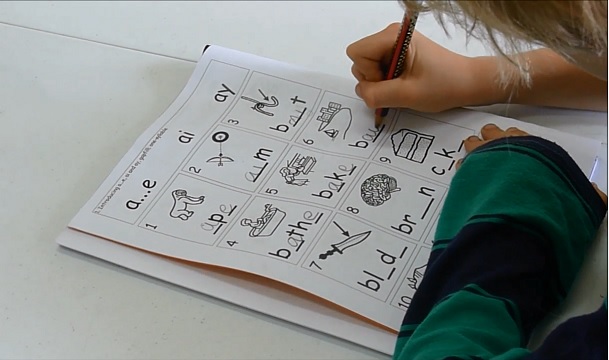Teaching vowel spellings
0 Replies
I’ve made a short video of myself teaching a student how to spell some words containing the sound “ay” as in “name”, “rain” and “play”, using my Workbook 4.
Teaching strategies and ideas are highlighted in onscreen text, here it is on Youtube.
I hope this is useful to people using, or thinking of getting, the Spelfabet Workbook 4 or 5, and/or that it includes some ideas and strategies that are useful to parents, aides and others who are teaching vowel spellings using other materials.
After we finished with the Workbook, this student and I moved on to sorting words containing the “ay” sound according to spelling pattern, a strategy recommended in many good synthetic phonics programs. I used pieces from my Movable Alphabet as column headings during this activity, but sometimes I just write them on pieces of paper or post-it notes.
Here’s the video, again with my tips and comments in onscreen text:
If you’d like to try this activity with your learner(s), you can find wordlists for all the different spellings of the sound “ay” here.
One-syllable words first
I usually stick to sorting one-syllable words at first, because sounding out words with more than one syllable involves a whole extra layer of complexity. You have to identify the syllable boundary, sound each syllable out, then put the syllables together and perhaps also work out the word stress.
Think of the words “record” and “moped”. “Record” could be something you do, in which case the stress is on the second syllable (re-CORD), or a thing hipsters put on a turntable, in which case the stress is on the first syllable (REC-ord).
Because my learners tend to have language difficulties and thus to need everything broken down into tiny steps, I like to teach them how to juggle word stress as a specific teaching point, after they know all the spellings in relevant words, e.g. by saying and writing words on this page in my Workbook 7, which is followed by a page where they write them again from memory:
 The word “moped” could be about past misery (rhyming with “hoped”) or motorbikes, rhyming with “go red” (yes, red ones really do go faster).
The word “moped” could be about past misery (rhyming with “hoped”) or motorbikes, rhyming with “go red” (yes, red ones really do go faster).
Having taught the “o…e” spelling in “mope” and the past tense “ed”, I find that I do sometimes have to explicitly teach my learners that what looks like an “o…e” as in “hoped” is often just two separate vowels in two separate syllables, as per this page in my Workbook 8:
Free wordlists for word sorting activities
The same word sorting activity as in the above video can be used to teach the spellings of any sound. Free wordlists for all the spellings of each of the 44 sounds of English can be found here.




Leave a Reply